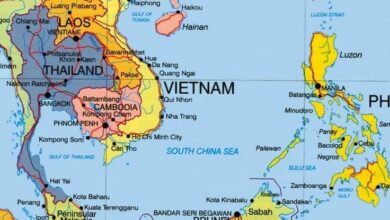Elon Musk Threatens Europe-America Rift
Elon Musk threatens to deepen the rift between Europe and America. His recent actions and statements, ranging from controversial tweets to business decisions impacting transatlantic relations, have sparked considerable debate and concern. This isn’t just about a tech mogul’s opinions; it’s about the potential for significant economic and geopolitical consequences, impacting everything from trade deals to international alliances.
We’ll delve into the specifics of Musk’s actions, analyze the reactions from both sides of the Atlantic, and explore the potential ramifications for the global landscape.
The situation is complex, fueled by a mix of political maneuvering, economic interests, and the ever-present influence of social media. We’ll examine how different media outlets are framing the narrative, the resulting public opinion, and potential strategies for de-escalation. Understanding the full picture requires considering the economic implications, the shifts in geopolitical alliances, and the potential for long-term damage to the transatlantic relationship.
Musk’s Statements and Actions
Elon Musk’s recent pronouncements and actions have sparked considerable debate regarding their potential to exacerbate tensions between Europe and the United States. His influence, amplified by his ownership of X (formerly Twitter) and SpaceX, means his words carry significant weight in the global arena, capable of shaping public perception and potentially influencing international relations. This analysis delves into specific instances of his statements and actions, examining their context and the subsequent reactions from both sides of the Atlantic.
Timeline of Musk’s Statements and Actions Affecting Transatlantic Relations
Several events throughout 2023 and early 2024 have contributed to concerns about Musk’s impact on transatlantic relations. While pinpointing a precise starting point is difficult, the increasing reliance on X for information dissemination, coupled with Musk’s outspoken nature, has created a fertile ground for misinterpretations and amplified disagreements. The lack of consistent messaging from Musk regarding his geopolitical stances further complicates the analysis.
One notable example is the evolving narrative surrounding his support for Ukraine, which has shifted over time, leading to differing interpretations and responses from both American and European leaders.
Elon Musk’s recent actions are causing a major transatlantic spat, further straining US-Europe relations. This political divide is mirrored domestically, as evidenced by the intense backlash against certain Republican policies; check out this article on how conservatives mobilize against republicans supporting red flag gun confiscation law , highlighting the deep partisan divisions within the US itself. Ultimately, Musk’s actions risk exacerbating these existing fractures, making international cooperation even more challenging.
Examples of Musk’s Public Statements and Their Context
Musk’s statements often lack nuance and are delivered via platforms like X, bypassing traditional media channels. This direct-to-audience approach, while effective for disseminating information quickly, can lead to misinterpretations and a lack of context. For instance, his comments on the ongoing conflict in Ukraine, initially supportive of the country, have evolved to include criticisms of Western aid and support.
This shift has drawn sharp criticism from various European officials who view his pronouncements as undermining the collective Western response to Russian aggression. His comments about Starlink’s role in the conflict, particularly concerning limitations placed on its usage, have further fueled this debate. In interviews, he has occasionally expressed opinions that are at odds with established foreign policy positions of both the US and EU, leading to increased scrutiny of his influence and potential impact on international relations.
The lack of a clear, consistent, and well-articulated foreign policy from Musk himself adds to the confusion and fuels speculation.
Comparison of Musk’s Statements and Reactions
The following table summarizes some key instances, contrasting Musk’s statements with the reactions from European and American officials. It’s important to note that the reactions are not monolithic; there’s a spectrum of opinions within both the US and Europe.
| Statement | Source | European Reaction | American Reaction |
|---|---|---|---|
| Statement expressing concerns about the sustainability of Western aid to Ukraine. | X (formerly Twitter) post | Criticism from several European leaders; concern over potential impact on Ukraine’s defense. Some argued that such statements undermine international support for Ukraine. | Mixed reactions; some echoed concerns about aid sustainability, others criticized Musk for potentially undermining the collective effort. |
| Comments suggesting limitations on Starlink’s usage in Ukraine. | Interview | Concern over the potential impact on Ukrainian military operations; some questioned Musk’s motives. Discussions arose concerning the reliance on private companies for crucial military infrastructure. | Similar concerns; debate about the appropriate role of private companies in military conflicts. Some suggested a potential breach of contract. |
| Statements seemingly downplaying the severity of the conflict in Ukraine. | Various interviews and X posts | Strong criticism from Ukrainian officials and many European leaders; accusations of being insensitive to the suffering of the Ukrainian people. | Mixed reactions, ranging from criticism to relative silence. Some emphasized the importance of a united front against Russian aggression. |
Economic Implications
Elon Musk’s recent pronouncements and actions have raised concerns about a potential deepening of the transatlantic rift, carrying significant implications for global trade and investment. The interconnected nature of the European and American economies means that decreased cooperation could trigger a domino effect, impacting various sectors and potentially slowing global economic growth.The potential for decreased cooperation between Europe and America presents a complex economic challenge.
The ramifications extend beyond simple trade disputes; they touch upon the very foundations of global investment strategies and the stability of international supply chains. Understanding the specific vulnerabilities and strengths of both continents is crucial to assessing the potential fallout.
Impact on Global Trade and Investment
A significant decrease in cooperation between Europe and America could lead to a contraction in bilateral trade. Increased tariffs, trade barriers, and reduced investment flows would be the most immediate consequences. This could ripple outwards, affecting global supply chains and potentially leading to increased prices for consumers worldwide. For example, the automotive industry, heavily reliant on transatlantic trade for parts and finished goods, could face significant disruptions.
Elon Musk’s recent actions are causing a lot of friction between the US and Europe, and honestly, it’s making me nervous about the future of transatlantic relations. This kind of political and economic divide feels eerily similar to the potential for further division a Trump-DeSantis ticket a Trump DeSantis ticket could create domestically, further fracturing our already fragile alliances.
Ultimately, Musk’s actions, mirroring the potential impact of a specific political pairing, could significantly deepen the already widening rift between America and Europe.
Similarly, the technology sector, with its complex web of international collaborations, would likely experience substantial challenges. The uncertainty surrounding future trade relations could also deter long-term investments, slowing down economic growth in both regions.
Industries Disproportionately Affected
Several industries stand to be disproportionately affected by a worsening transatlantic rift. The automotive industry, as mentioned, is highly integrated, with significant cross-border trade in parts and finished vehicles. The aerospace industry, with its large-scale collaborative projects, would also face significant headwinds. The pharmaceutical industry, reliant on global research and development collaborations, could experience delays in drug development and increased costs.
The technology sector, particularly in areas like semiconductors and software development, where transatlantic partnerships are common, could also see significant disruptions. Finally, the agricultural sector could be impacted by trade disputes concerning food products and agricultural inputs.
Economic Strengths and Vulnerabilities
Europe and America possess distinct economic strengths and vulnerabilities in the context of a potential transatlantic conflict. The European Union, while facing challenges related to internal economic disparities and energy security, benefits from a large single market and a strong social safety net. However, its dependence on energy imports makes it vulnerable to geopolitical instability. The United States, with its large domestic market and technological innovation, possesses significant economic resilience.
Elon Musk’s recent actions are causing a major transatlantic spat, further straining US-EU relations. This comes at a time when domestic issues are also flaring up; the situation in Sacramento, highlighted by this news report california sheriff blasts folks in sacramento after illegal immigrant allegedly shoots deputy sparks chase , shows how internal divisions can exacerbate international tensions.
Ultimately, Musk’s actions risk overshadowing more pressing concerns, potentially deepening the already fragile relationship between Europe and America.
However, its high national debt and increasing political polarization pose potential risks. A reduction in transatlantic cooperation could exacerbate these existing vulnerabilities, potentially leading to slower economic growth and increased social unrest in both regions.
Potential Economic Consequences
The potential economic consequences for both continents are considerable:
- For Europe: Reduced export revenues, increased import costs, decreased foreign direct investment, potential recessionary pressures, and increased unemployment in export-oriented sectors.
- For the United States: Reduced export revenues, increased import costs, decreased foreign direct investment, potential inflationary pressures, and job losses in export-oriented industries.
- Globally: Increased prices for consumers, disruptions to global supply chains, slower economic growth, and heightened geopolitical instability.
Geopolitical Ramifications
Elon Musk’s actions and statements, while seemingly focused on business interests, have the potential to significantly reshape the global geopolitical landscape. His influence, amplified by his ownership of influential communication platforms, can exacerbate existing tensions and create new fault lines in international relations. The potential rift between Europe and America, fueled by these actions, presents a complex and evolving situation with far-reaching consequences.The potential for a deeper transatlantic rift could significantly alter the global balance of power.
A weakened Western alliance, fractured along ideological and economic lines, would create opportunities for other global powers to assert their influence. This could lead to a more multipolar world order, potentially less stable and more prone to conflict. The ability of the West to present a united front on issues like climate change, cybersecurity, and the response to authoritarian regimes would be diminished, creating space for alternative geopolitical narratives and power structures to take hold.
Impact on Existing Alliances and Partnerships
A significant consequence of the escalating tensions between Europe and America is the potential strain on existing alliances and partnerships. NATO, for example, could face internal divisions as European members navigate their relationships with both the United States and other global powers. The economic interdependence between Europe and America, which has been a cornerstone of their partnership, could be threatened by trade disputes and sanctions.
This weakening of transatlantic ties could embolden adversaries and complicate efforts to address shared challenges. The ability of the West to effectively respond to global crises would be diminished, potentially leading to instability in various regions. For instance, a less cohesive response to Russian aggression in Ukraine could embolden further expansionist moves.
Responses of Other Global Powers
The response of other global powers to the growing rift between Europe and America will be crucial in shaping the future geopolitical order. China, for example, could seek to exploit this division to advance its own strategic interests. It might strengthen economic ties with both Europe and America individually, while simultaneously promoting alternative global governance structures that challenge Western dominance.
Russia could also benefit from a weakened Western alliance, potentially enabling it to pursue its own expansionist agendas with less resistance. Other regional powers might also attempt to leverage the situation to enhance their own influence in their respective regions, leading to a more fragmented and potentially unstable global order.
Potential Shifts in Geopolitical Alliances
The following table illustrates potential shifts in geopolitical alliances as a result of the widening rift between Europe and America. These are speculative scenarios based on current trends and potential future developments. The actual outcome will depend on a multitude of factors, including the specific actions taken by various actors and the evolution of the international situation.
| Country/Organization | Current Alignment | Potential Shift | Rationale |
|---|---|---|---|
| China | Increasingly independent, but with economic ties to both Europe and the US | Strengthened ties with both Europe and the US individually, while promoting multilateralism | Exploiting the transatlantic rift to increase global influence. |
| Russia | Adversarial towards the West | Increased assertiveness in Eastern Europe and beyond | Taking advantage of a weakened Western alliance. |
| European Union | Closely aligned with the US within NATO and other frameworks | Greater emphasis on strategic autonomy and diversification of partnerships | Seeking to reduce dependence on the US and hedge against potential future conflicts. |
| India | Strategic partnership with the US, but also maintains close ties with Russia | Increased non-alignment, playing a more independent role in global affairs | Seeking to maximize its own national interests in a multipolar world. |
Public Opinion and Media Coverage: Elon Musk Threatens To Deepen The Rift Between Europe And America
Elon Musk’s increasingly erratic behavior and pronouncements have created a complex and often contradictory landscape of public opinion and media coverage across Europe and America. While some admire his entrepreneurial spirit and technological vision, many others view his actions with growing skepticism and concern, leading to a significant divergence in how his influence is perceived on both sides of the Atlantic.
This disparity is further amplified by the varying approaches taken by media outlets in each region.The prevailing public opinion in Europe seems to be more critical of Musk than in America. This is partly due to concerns about the potential impact of his actions on European data privacy regulations and the broader geopolitical landscape. In America, while criticism exists, a segment of the population continues to view him as a visionary, overlooking or downplaying the potential negative consequences of his decisions.
This difference in perception stems from a variety of factors, including differing regulatory environments, cultural nuances, and the overall media landscape.
European Public Opinion and Media Portrayals
European media often frames Musk’s actions within the context of broader concerns about technological monopolies, data security, and the influence of powerful individuals on global affairs. News outlets like the BBC and the Guardian frequently highlight the potential risks associated with Musk’s control over Twitter and SpaceX, emphasizing potential threats to free speech, misinformation, and the concentration of power.
For example, the BBC has published numerous articles analyzing the impact of Musk’s Twitter policies on freedom of expression, often presenting a more critical perspective than many American outlets. The framing tends to emphasize the potential negative impacts on European society and values. Conversely, some smaller, more niche publications might offer a more balanced or even sympathetic perspective, but the overall trend in major European news leans toward critical analysis.
American Public Opinion and Media Portrayals
In contrast, American media coverage often presents a more nuanced picture, with a wider range of perspectives represented. While outlets like the New York Times and the Washington Post offer critical analyses of Musk’s actions, other outlets, particularly those with a more conservative leaning, tend to be more forgiving or even celebratory of his accomplishments. Fox News, for example, frequently highlights Musk’s business successes and technological innovations, often downplaying or ignoring the controversies surrounding his actions.
This creates a more polarized media landscape in the US, where the framing of Musk’s actions often aligns with pre-existing political and ideological divides. This contributes to a less unified public opinion compared to Europe, where a more consistent critical narrative is prevalent in mainstream media.
Comparative Analysis of Media Framing
The differences in media framing are stark. European media tends to prioritize the potential negative societal impacts of Musk’s actions, focusing on issues like data privacy, misinformation, and the erosion of democratic norms. American media, while acknowledging these concerns, often balances them with a celebration of innovation and entrepreneurial spirit. This leads to a significant divergence in the overall narrative, contributing to the growing transatlantic rift.
The contrasting perspectives are not simply a matter of different journalistic styles; they reflect deeper cultural and political differences in how power, technology, and regulation are perceived on both continents. The contrasting framing reinforces existing biases and deepens the sense of a widening gap between European and American perspectives on the role of tech giants and their influence on global affairs.
Potential Mitigation Strategies
The escalating tensions between Europe and America, fueled in part by Elon Musk’s pronouncements and actions, demand proactive strategies to de-escalate the situation and foster renewed cooperation. Ignoring the rift would be detrimental to global stability and economic prosperity. A multifaceted approach, involving concerted efforts from governments, businesses, and individuals, is crucial for achieving lasting reconciliation.The core challenge lies in rebuilding trust and fostering open communication channels.
This requires a shift from reactive responses to proactive diplomacy and a commitment to understanding differing perspectives. The following strategies offer potential pathways towards reconciliation.
Governmental Roles in Conflict Resolution, Elon musk threatens to deepen the rift between europe and america
Governments play a pivotal role in mitigating the transatlantic rift. This includes high-level diplomatic engagements, focusing on clear and consistent communication, avoiding inflammatory rhetoric, and prioritizing collaborative problem-solving. The establishment of joint task forces, focusing on specific areas of concern (e.g., energy security, technological cooperation, cybersecurity), could facilitate dialogue and the identification of shared interests. Furthermore, strengthening existing international organizations and forums, such as NATO and the EU, to provide platforms for open communication and conflict resolution, is essential.
Examples include the consistent engagement of US and EU diplomats in various international summits and forums, demonstrating a commitment to dialogue and cooperation despite political differences. The success of these initiatives hinges on a commitment to multilateralism and a willingness to find common ground.
Business Contributions to Transatlantic Harmony
Businesses, as key players in the global economy, possess significant leverage in bridging the divide. Promoting transatlantic trade and investment through collaborative projects and initiatives demonstrates a shared commitment to economic interdependence. This can involve joint ventures, technology sharing, and the development of shared supply chains, fostering economic ties that transcend political differences. Companies can also contribute by actively supporting initiatives promoting cultural exchange and understanding, such as sponsoring educational programs and exchange visits.
For example, multinational corporations with significant operations in both Europe and America could act as informal diplomatic channels, fostering communication and understanding between stakeholders on both sides of the Atlantic.
The Importance of Public Diplomacy and Individual Actions
Public diplomacy plays a crucial role in shaping perceptions and fostering understanding. This involves targeted communication campaigns aimed at countering misinformation and promoting a more nuanced understanding of the other side’s perspectives. Educational initiatives focusing on transatlantic history, culture, and values can help bridge cultural divides and foster empathy. Individuals, too, can contribute by actively engaging in constructive dialogue, challenging misinformation, and promoting cross-cultural understanding through personal interactions and online platforms.
This could involve participating in online forums, engaging in respectful discussions with people holding different viewpoints, and actively supporting organizations promoting transatlantic cooperation. The cumulative effect of such individual actions can contribute significantly to shifting public opinion and fostering a more positive climate for reconciliation.
Actionable Steps Towards Reconciliation
Effective reconciliation requires concrete actions. The following steps, if implemented collaboratively, could significantly contribute to bridging the transatlantic gap:
- Establish a high-level US-EU task force dedicated to addressing concerns related to technology, energy, and trade.
- Increase funding for educational and cultural exchange programs focusing on transatlantic relations.
- Promote joint research and development initiatives in areas of mutual interest, such as climate change and renewable energy.
- Develop a joint communication strategy to counter misinformation and promote mutual understanding.
- Strengthen existing international institutions and forums to facilitate dialogue and conflict resolution.
Elon Musk’s actions have undeniably injected a significant dose of uncertainty into the already complex relationship between Europe and America. While the immediate impact might be difficult to fully assess, the potential for long-term damage to trade, investment, and international cooperation is undeniable. The path forward requires careful consideration of the economic and geopolitical implications, open communication, and a concerted effort to de-escalate tensions.
Whether this rift will deepen or heal remains to be seen, but one thing is clear: the actions of individuals, even powerful ones, can have profound global consequences.





